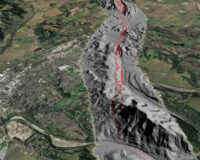On Saturday, Agua Caliente’s Mountain Avenue, a narrow road that wends upward through a modest neighborhood and culminates at the top of the hill at the entrance to Ty Caton’s future winery – which some neighbors oppose – was clogged in spots by cars stopping at garage sales.
The sales were put on by the Agua Caliente Park Neighbors (ACPN) to raise money for a traffic study to prove the proposed winery a traffic hazard.
Resident Joy Massa said she and her group hope to prove to the Sonoma County Board of Zoning Adjustments (SCBZA) that traffic on the barely two-lane road, with its steep climb and occasionally precipitous drops, is already problematic, and that increased traffic, which she said the winery would create, could present a safety hazard.
“More and heavier traffic, including semi-trailers, is on the way,” said Massa, thanks to a unanimous SVBZA ruling to grant the Caton family a use permit for their new winery.
Ty Caton, managing partner and winemaker, who is shepherding the project, said in a recent interview that he feels the “movement against us” and is puzzled that there continue to be some misconceptions about the winery and its impact on the community. “We want to be able to make wine from the grapes that we grow, and do it on our property,” he said, adding that he has done everything according to the letter of the law. “We have tried to communicate what we want to do and how we want to do it and have taken all the appropriate measures.”
The property is a 100-acre tract, of which 40 acres are planted in grapes and the rest is natural habitat. The vineyard is certified sustainable, with six acres certified organic. Now, Caton said, the grapes have to be trucked off the property to be crushed. If the winery’s built, all those trips will be eliminated. “Those grapes will be staying up on the hill. During harvest, it’ll actually reduce traffic.”
Ellen Conlon, of the neighbors’ group ACPN, spoke before the BZA and objected to the plan on the grounds that the road up the hill is currently below county fire standards and that approving projects would create a safety hazard for residents in the area.
However, according to Caton, the plans include adding additional fire hydrants as required by code. “So it’s complete improvement,” he said. “I think the county fire department just wants to do a little tree trimming.”
The winery will be a 50-by-100-foot metal building “that no one can see” with a maximum annual production capacity of 15,000 cases. There will be no public tastings, no tours, no events, no retail sales. Caton family representative Mike Morrison, of Common Ground Land Planning Services, stated before the BZA that, “Since there will be a reduction of truck traffic on the road, there will be no significant impact on air quality, as claimed by opponents. Also, the county owns the right-of-way to the road, and has prescriptive access to the last segment. The county maintains the road all the way to the Caton property at the end.”
“We feel we’ve done the right thing in all ways,” said Caton. Officials seem to agree. “We’ve had unanimous approval from the citizens’ advisory group and unanimous support from the county,” he said. Nevertheless, Conlon and her group appealed the ruling on Aug. 4.
Now, the group is looking to raise the money they need to hire traffic engineers to perform a “peer review” for what Massa calls the “grossly inaccurate” study upon which the BZA formed its decision. By Sunday night, she pronounced the garage sale a success. “When people learned of our cause,” she said, “they’d often say, ‘Keep the change.’” By the end of the day, with one cash box still to be counted, she figured they had made $2,500. “So we can see the light at the end of the tunnel. We’re in sight of our $5,000 goal. It was a great success. Absolutely splendiferous.”
Agua Caliente neighbors raise funds for traffic study
More from NewsMore posts in News »




